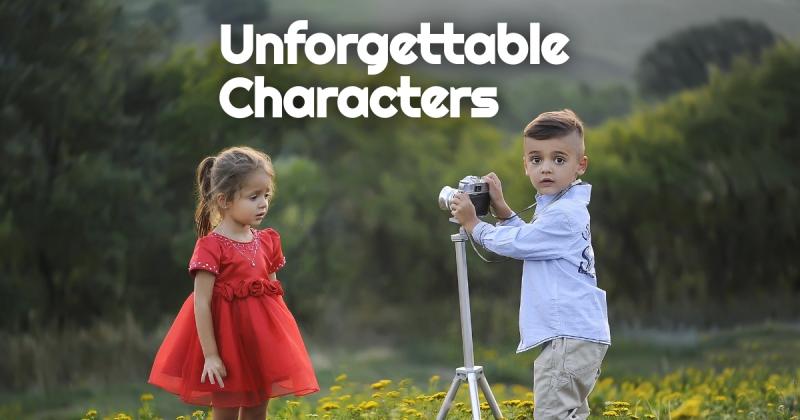
Developing endearing qualities for unforgettable characters is a challenge, but not impossible.
Every novelist strives to create unforgettable characters whom the reader will always treasure. We dream of five-star reviews that send our books to the top of bestseller lists. Characters of merit hit the must-read charts of book clubs, and let’s face it, a movie deal sounds incredible. We dream of babies named after our characters, taking our story players to another memorable level, and establishing solid values through our book. But how do we make those dreams a potential reality?
Writers detest the criticism of stereotyped characters, predictable behavior, and gestures that show no imagination. Developing endearing qualities for unforgettable characters is a challenge, but not impossible.
The following ten tips will add depth to your characters and elicit glowing reviews from your readers.

1. Careers/Professions
Ho-hum jobs are okay, but when we place a character in an unusual work role, we create more depth, adding layers to the character development.
Consider these professions:
-
Skunk whisperer
-
Casket salesperson
-
Goose-chaser – to keep geese off property
-
Airplane Repo
-
Dog trainer that locates cadavers after natural disasters
-
Quilt appraiser
-
Food stager
-
Exhibition coordinator at a museum
-
Designer of custom motorcycles
-
Stunt man or woman
For additional career ideas: https://financebuzz.com/weird-jobs-that-pay-well
2. Education
Your character has received an education, either formally or through the school of hard knocks. Both provide intense experiences that are valuable to your story. Step beyond homeschool, online, private, rural, or busy city.
Consider these forms of education:
-
A school environment under a tree in a third-world country
-
A school setting where the character is an outcast
-
A character from another planet
-
A character who is hearing impaired, vision impaired, and/or disabled.
-
In a foreign land with a foreign language
3. Hobbies
Special interests give our characters a twist of fun or eccentricity. If a writer chooses to assign a character a hobby, weave the interest into the story.
Hobbies reflect a diversion from day-to-day activities. They can be typical or exceptional.
-
Stamp collecting
-
Model trains
-
Horse racing
-
Rollerblading competition
-
Vintage toys
4. Life Experiences
Our characters’ responses to the world around them are formed from life experiences. These challenges and victories mold them into who they are on page one, chapter one of our stories.
What situations have shaped your character?
-
Loving childhood or abusive parents/guardians
-
Health issues
-
Mental issues
-
Spiritual issues
-
Lucky or unlucky in love
-
Confident or lack of confidence
-
Rich, poor, or middle-class
-
Near-death experience
-
Survivor guilt
5. Personal appearance
First impressions are often lasting, and how readers perceive our characters is critical to how our story player is perceived. Sometimes we label a career, culture, or role that is played making the character’s role predictable—possibly boring.
What factors would make your character stand out in a good or not-so-good way?
-
Showers three times a day or once a week
-
Believes in cutting his or her own hair, and the look is, well. . . different
-
Practices the art of makeup to excess or not at all
-
Adheres strictly to the latest fashion trends
-
Ignores fashion
-
Dresses in favorite color from hair to toes

6. Personality
Establishing your character’s personality is essential to developing how he/she will react and respond in various situations. Personality testing reveals the inner character, whether someone is an introvert or extrovert, whether they are a thinker or a feeler, and more. The testing type or method the writer uses is a personal preference. What’s important is understanding why a character behaves in a specific way and how that is shown in the story.
The following are popular personality testing:
-
Carl Jung’s and Isabel Briggs Myers’ (my favorite)
7. Residence
Our characters’ homes reflect culture, personal taste, social status, wealth, education, and so much more—unless the character is eccentric. The writer chooses, and the result enriches the story.
Does your character reside in a predictable or unpredictable home?
-
Totally expected; nothing unusual
-
Tent
-
Under a bridge
-
Penthouse
-
Suburbs
-
Farm
-
Apartment
-
In their vehicle
8. Skills, Talents, or Special Abilities
All of us are born with skills, talents, and/or special abilities. So are our characters. Sometimes, they are aware of them, and sometimes they are not. But these abilities do enhance our character and the story.
Here are a few ideas:
-
Left-handed in a culture that disapproves
-
Math whiz
-
Speaks many languages
-
Shoots firearms or throws a knife with either hand
-
Telepathy
-
Photographic memory
-
Synesthesia
9. What Does the Character Regret?
Regrets can haunt our characters. These confidence destroyers often serve to paralyze our characters or lead them to act inappropriately, especially if the character refuses to deal with them in a healthy manner. The regret is rarely vocalized and is usually a secret.
Regrets that plague a character usually come in the form of guilt. According to studies, the most common regret is not taking the time to let loved ones know they are valued. But there are others.
Let’s explore a few regrets:
-
Bitter regrets that the character believes are unforgivable and that create thoughts of suicide
-
Inappropriate relationships
-
Ignoring the needs of a loved one
-
Actions that resulted in tragedy
-
This article discusses regrets and helped me with my characterization.
10. What Does the Character Want More Than Anything?
Our characters might think they know what they want, but too often the core comes down to what the character needs. First, the writer needs to establish that critical want, then dives into the motivation behind it for those special nuggets. The character must want the tangible or intangible item so badly that he/she will do anything (within their personality) to obtain it.
Explore these wants:
-
Character wants to be rich but doesn’t want to work for it
-
Character desires love without sacrifice
-
Character longs for a highly coveted position without knowledge or education
-
Character covets what someone else possesses
-
Character chooses not to want anything except to be left alone
-
Character decides to overcome an illness or disability
-
Character searches for a way to never die
In researching this post, I found a List of 234 Interesting Character Quirks. I also found valuable information at this site about Maslow’s Hierarchy of Needs.
Let’s share! In what ways do you develop an unusual character?
